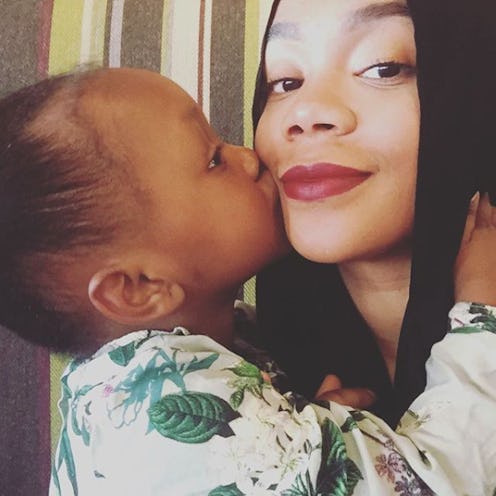Life
I'm A Black Muslim Woman & Here's What I Plan To Teach My 4-Year-Old Daughter

I am a Black Muslim revert raising a beautiful Black girl in Islam. She is four years old, and I have high aspirations for my daughter. I hope for her to be able to live in an inclusive, nourishing environment, and for her to be able to excel in the wider society. I introduce her to Black female role models such as Rosa Parks, Mary McLeod Bethune, Harriet Tubman, Oprah Winfrey, and Maya Angelou, and female Muslims from history, like Khadija (r.a.) and Aisha (r.a.), who defy expectations. I aim for my daughter to be a strong-willed, independent, motivated, and intelligent woman.
But here's my question: Who does my daughter have, living and breathing right now, to look up to? What about other young, Black Muslim girls like her? With such little media representation of Black Muslim women, how do we expect girls like my daughter to feel included in a society? With the experience of being represented and included comes feelings of empowerment, courage, creativity, and love. These are things I want for my daughter.
Lack of representation, though it may seem superficial, has a huge effect on marginalized communities. With little or no representation of Black Muslims in mainstream media, people are unlikely to be able to fully grasp or connect with the issues we face as individuals. My daughter is an impressionable four-year-old girl — can you imagine how she'll view herself when she grows up, if she doesn't see herself represented around her?
For this reason, parenting my Black Muslim daughter is my excuse to be as "extra" as I possibly can, in almost everything that I do: I need to be the representation my daughter sees, as a young, Black Muslim girl who will one day become a woman (Insha’Allah). I will be the confirmation she needs to wear her hijab in any style that she wants. I will be her confidence to wear the clothing of her ancestors, and adorn herself with their colors and patterns without hesitation. I will not — I cannot — allow myself to feel self-conscious and withdraw. I force myself to be vulnerable and put my creativity on the table. It is with this influence that I hope to give her the tools to live an independent, fulfilling life. Being a mother and raising a child is not easy, and there is no one right way or rule book to follow so I can only tackle this the only way I know how — and that is to go through it myself.
For that reason, I include my daughter in the majority of the things that I do. She hears me read and re-read articles I write. She comes with me to my photoshoots, and she helps me set up my events. She is only four years old, but she does — and sees — as much as she can.
But all her representation can't just come from me. I have to be a part of the community of women pushing back against harmful (and untrue) narratives that say Muslim women are "oppressed," "quiet," and "subservient," that Black women are "loud-mouthed" or "angry." This community includes women like make-up artist Zainab Hassan, who will show my daughter to be proud of her ebony skin, to be gracious always, and bless everyone with a smile. Women like Shazia Hossen, an amazing hijabi personal trainer, who will teach her that strong women do exist and not to let anyone tell her different. Or Rikki Knight, co-founder of Culturing Success, who will teach her to be confident, stand strong, and never lower her standards for anyone. It will take women like Ladan Takow, a women's rights activist, and Ni’mah Yahya, founder of MNTQ podcast series, who will teach her to express herself, and to fight for what's right. She'll need women like chef Marie-Olive Akinrinlude to teach her to be proud of her traditional food and, if she so chooses, to bring her pounded yam and efo into the office for lunch. She'll need to see more women on YouTube like Hafsah Dabiri and Sawda Onanuga to teach her that she does indeed have the sauce — in fact, she is the sauce.
These women and so many more are part of a sisterhood making history with their excellence, drive, and determination to step out into the unknown. You see, it takes a village to raise a child — and it is going to take more than just me to teach my daughter to be proud of her identity.
—Produced in conjunction with Muslim Girl